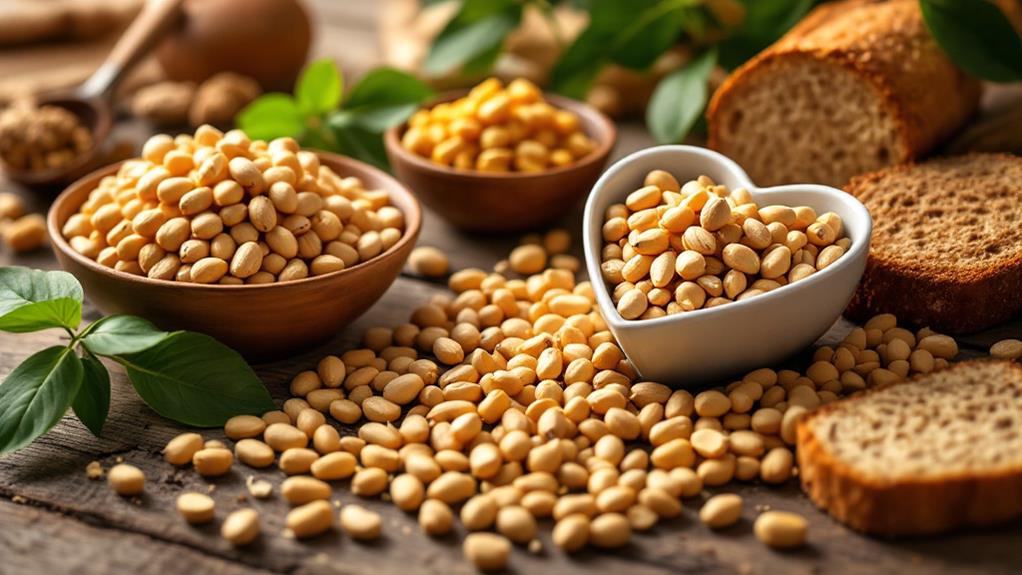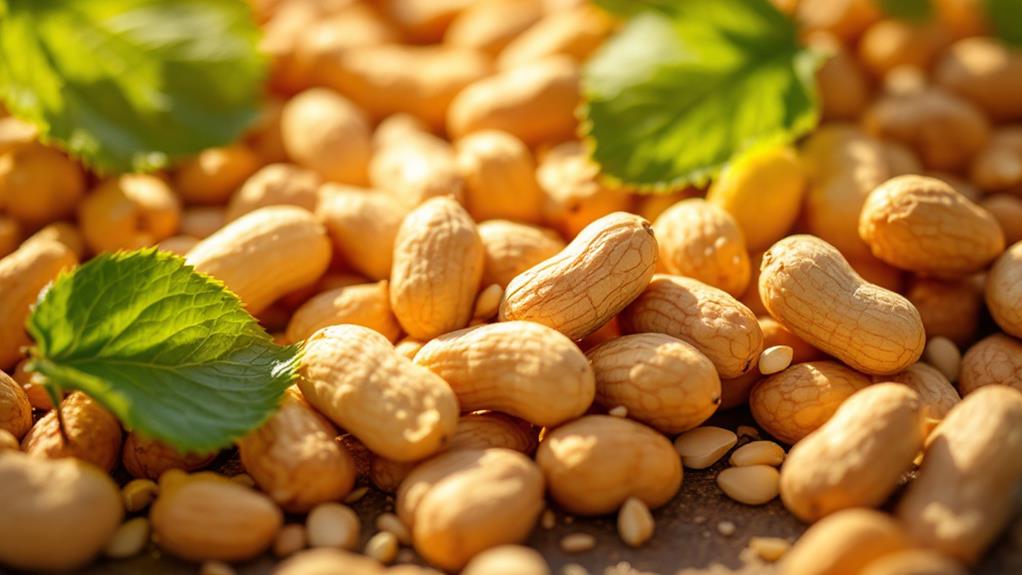Peanuts: A Heart-Healthy Food You Should Be Eating

You should make peanuts a regular part of your diet. They're not just tasty; they're packed with monounsaturated fats that lower LDL cholesterol and reduce heart disease risk. Eating them at least twice a week can cut cardiovascular disease risk by 13%. Peanuts also help maintain healthy blood pressure and combat inflammation with antioxidants like resveratrol and vitamin E. Plus, their fiber and protein content help keep you full and satisfied. To reap maximum heart-health benefits, aim for about 1.5 ounces daily, irrespective of whether through snacks or meals. Uncover how this simple enhancement transforms your heart health voyage.
Understanding Peanuts and Heart Health
In regard to heart health, understanding the role of peanuts is essential. Peanuts are more than just a tasty snack; they're packed with nutrients that support heart health. Rich in monounsaturated fats, peanuts help lower LDL cholesterol levels, which is important for reducing the risk of cardiovascular disease. Including peanuts in your regular diet can lead to a 15% lower risk of heart disease, as shown in a Harvard study of over 210,000 participants.
Moreover, regular consumption of peanuts, even just twice a week, is associated with a 13% reduction in the risk of cardiovascular disease. This makes them a valuable supplement to a balanced diet. The beneficial nutrients in peanuts, such as magnesium and potassium, play a significant role in maintaining healthy blood pressure levels, further supporting cardiovascular health.
Peanuts also boast significant anti-inflammatory properties. These properties contribute to overall heart health by combating inflammation, which is a known factor in the development of heart disease. By incorporating peanuts into your diet, you're not only enjoying a delicious snack but also taking proactive steps towards maintaining a healthy heart. So, don't hesitate to make peanuts a regular part of your balanced diet.
Cholesterol Management With Peanuts
In relation to managing cholesterol, peanuts can be a powerful ally. They play a vital role in lowering LDL cholesterol while maintaining healthy HDL levels, which is fundamental for heart health. Including peanuts in your diet can greatly reduce total cholesterol levels, particularly when you consume them as part of a balanced diet. This can lower your risk of heart disease and improve your complete lipid profile.
Phytosterols in peanuts help block cholesterol absorption in your intestines, making them an effective tool for cholesterol management. Regular consumption of peanuts can also lead to lower triglyceride levels, with studies showing a remarkable 32% reduction in triglyceride rise after high-fat meals when peanuts are included.
Here's why peanuts are beneficial for cholesterol management:
- Lower LDL levels: Peanuts help reduce the "bad" cholesterol that can clog arteries.
- Maintain HDL levels: They support the "good" cholesterol that aids in removing excess cholesterol from your bloodstream.
- Reduce triglycerides: Regular intake can lessen the rise in triglycerides after meals.
- Phytosterols: These compounds block cholesterol absorption, further supporting heart health.
Peanuts for Blood Pressure Control

Many studies show that regular peanut consumption can greatly lower diastolic blood pressure, which is vital for heart health. By incorporating peanuts into your diet, you can take advantage of their low sodium content, typically less than 140mg per serving. This low sodium level is advantageous for maintaining healthy blood pressure levels, a key aspect of cardiovascular health.
Peanuts are packed with nutrients like magnesium and potassium, both of which play critical roles in blood pressure control. Magnesium helps relax blood vessels, improving blood flow and reducing resistance, while potassium helps balance sodium levels in the body. Together, these nutrients support healthier systolic and diastolic blood pressure readings.
Incorporating peanuts into your meals can considerably improve cardiovascular function. A diet rich in peanuts contributes to a notable reduction in both systolic and diastolic blood pressure, making it an effective component of a heart-healthy diet. Regardless of whether you enjoy them as a snack or as part of a meal, peanuts can be a tasty and strategic supplement to your efforts in managing blood pressure. By making peanuts a regular part of your healthy diet, you're taking a significant step towards better heart health.
Inflammation Reduction Benefits
Beyond their role in managing blood pressure, peanuts also offer impressive benefits in reducing inflammation. By incorporating peanuts into your diet, you can utilize their rich supply of antioxidants, such as resveratrol and vitamin E, combating inflammation and oxidative stress. These antioxidants play an essential role in supporting heart health and reducing the risk of cardiovascular disease. Regularly consuming peanuts can lower levels of inflammatory markers in your blood, including C-reactive protein (CRP), which is closely linked to cardiovascular disease risk.
The unique composition of peanuts, featuring polyunsaturated and monounsaturated fats, improves their anti-inflammatory properties, promoting vascular health. Adding peanuts to your daily intake can greatly decrease inflammatory responses, especially beneficial if you're at risk of chronic diseases.
Consider these benefits of including peanuts in your diet:
- Antioxidants: Combat inflammation and oxidative stress, enhancing heart health.
- Healthy fats: Monounsaturated and polyunsaturated fats support vascular function and reduce inflammation.
- Lower inflammatory markers: Reduced levels of CRP and IL-6, vital for managing cardiovascular disease risk.
- Dietary fiber: Aids in maintaining general health while supporting anti-inflammatory effects.
Nutritional Components of Peanuts

Peanuts' nutritional richness makes them a powerhouse food choice for anyone looking to improve their diet. With about 7 grams of protein per ounce, they support muscle health and keep you feeling full longer. This makes peanuts an excellent supplement to your meals or snacks. The presence of monounsaturated fats in peanuts is vital to advancing heart health by lowering LDL cholesterol levels. These healthy fats make peanuts an ideal part of a heart-healthy diet.
Packed with important vitamins and minerals like manganese, niacin, copper, magnesium, and potassium, peanuts play a significant role in maintaining cardiovascular health. These nutrients help with blood pressure control and general heart function. In addition, the high dietary fiber content in peanuts aids in digestion, regulates cholesterol levels, and supports tissue repair, improving your body's overall health.
Peanuts are also low in carbohydrates, making them a smart choice for blood sugar management. Their nutrient density guarantees you're getting a lot of nutritional benefits without spiking blood sugar levels. Regardless of whether you're looking to elevate your heart health, manage cholesterol levels, or maintain a balanced diet, peanuts provide a versatile and nutritious option.
Recommended Peanut Serving Sizes
To improve the heart-healthy benefits of peanuts, understanding the appropriate serving sizes is essential. For adults, the recommended daily consumption is 1.5 ounces of peanuts, which equals a small handful or about 2 tablespoons of peanut butter. This portion helps you enjoy the heart health benefits without overindulging in their calorie density. Remember, moderation is vital. Peanuts are rich in healthy fats, but consuming too much can lead to excessive calorie intake.
Here's a quick guide to keep you in check:
- Adults: Aim for about one ounce, or a quarter cup, of whole peanuts per serving.
- Children: Adjust portions based on developmental stage and needs; consult a pediatrician for tailored advice.
- Type: Opt for raw or dry-roasted peanuts to optimize health benefits and avoid added oils or salt.
- Frequency: Incorporate peanuts into your diet 4 to 6 times a week for ideal heart health.
When considering peanuts for children, a pediatrician consultation is recommended to determine the right serving sizes. By following these guidelines, you can enjoy the heart-healthy benefits of peanuts while maintaining balance and moderation in your diet.
Incorporating Peanuts Into Your Diet

Regularly incorporating peanuts into your diet can be a delicious way to improve your heart health. By including 1.5 ounces of peanuts daily, you can help lower cholesterol and blood pressure levels, thanks to their healthy fats and protein content. They're a versatile component to meals and snacks, making it easy to reap these benefits.
Start your day by blending peanuts into your smoothies or sprinkle them over salads for a crunchy twist. Both options offer a lift of flavor and nutrition. For a heart-healthy snack, consider roasted peanuts, which provide a satisfying dose of protein and healthy fats, keeping you full longer.
Incorporate unsalted peanut butter into your routine by spreading it on whole-grain bread or using it as a dip for fruits. This not only improves the taste of your meals but also supports your heart health goals. Don't forget about peanut oil—it's perfect for salad dressings or sautéing, adding a rich flavor while supplying healthy fats.




